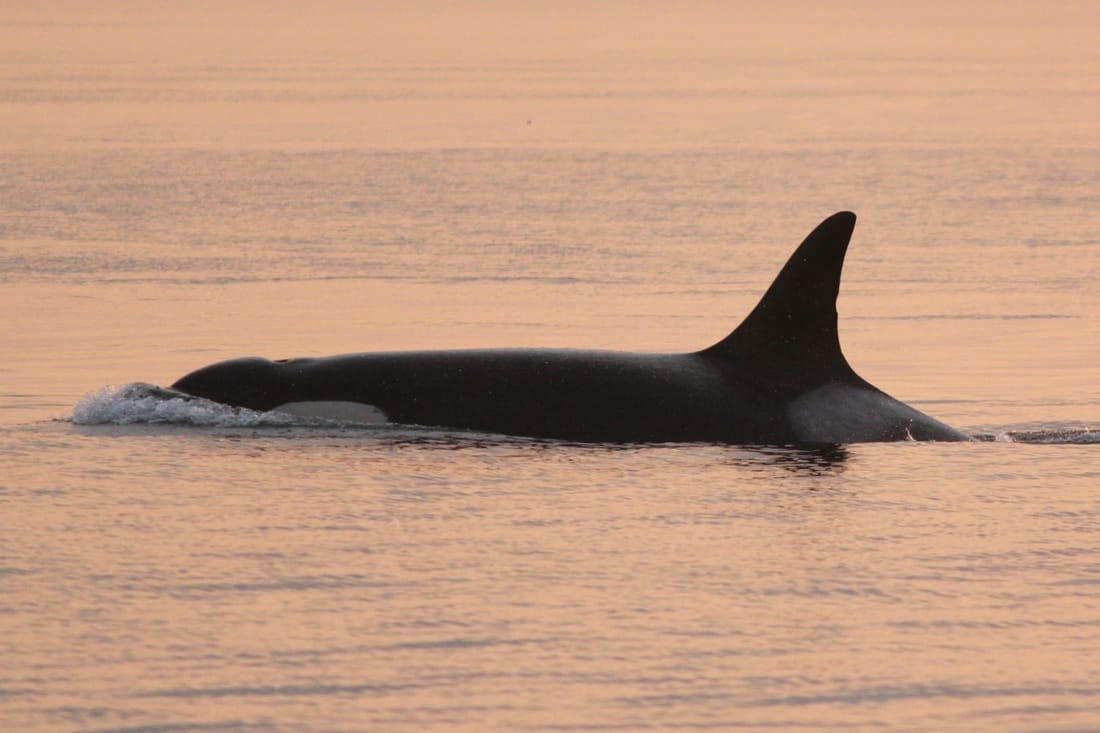Granny was a living legend, famous at home and across the world; a matriarch and guiding light for critically endangered Southern Resident orcas. Researchers knew Granny as J2, the leader of the Southern Resident orca community. Granny had been missing for months and now, sadly, the Center for Whale Research (CWR) recently announced that Granny is presumed dead . Without her, we are now faced with the sad questions: Who will lead the Southern Residents? And what will it take to save her family?
At an estimated 105 years old, Granny was the oldest known orca in the world. She was photographed and identified at the beginning of CWR’s annual orca census more than 40 years ago, already an adult and leader of her family. The population studies of the Eastern North Pacific orcas – the Northern and Southern Residents, and the West Coast Transients (Bigg’s) – established the existence of multiple populations and ecotypes of orcas off the west coast of the United States and Canada, and gave researchers a snapshot of the complex social lives of these orcas.
Resident orcas live in family groups led by elder females. These matriarchs play a crucial role in the daily lives and overall survival of their pods. Granny was a source of historic knowledge for the Southern Residents; she knew the timing of salmon runs, the maps for finding food, the safe places to evade detection, the cultural traditions of her family. Without Granny, how much of this knowledge will be lost? So many things in Granny’s world changed over her lifetime. What did she pass along to younger Southern Residents, and what has changed so much that it will be forgotten?
Granny (J2) in evening light, August 2015. Image used with permission: Melisa Pinnow/San Juan Orcas

Granny was born into a larger Southern Resident population, during a time of more abundant salmon and cleaner waters. In the early 1900s, cars were a novelty and the Pacific Northwest was still mostly untamed wilderness. Telegrams were a common way to communicate across long distances. Toxins were not yet a concern and people still freely dumped waste into waterways, assuming the great ocean would wash it away. Salmon runs were already declining, but were still plentiful enough to feed the Southern Resident orcas.
A life of over 100 years will see many changes. Granny witnessed the decrease of salmon, in size and abundance, from overfishing, habitat loss, and the construction of dams that choked wild rivers. She avoided the wrath of angry fishermen, shooting at orcas for taking their fish; and the rumored target practice of orca pods by Naval forces. The development of the Pacific Northwest brought hundreds of thousands of people, who tore up the forests and polluted the waters. Runoff from growing industrial and agricultural practices introduced new and deadly elements into her waters, but Granny survived it all. She knew an ocean before the increase of shipping traffic and the development of Navy sonar. Increasing human-created noise forever changed the soundscape of her underwater world, and is already having lasting impacts on her family.
She was a symbol of freedom during the brutal capture era of the 1960s and 70s, when an estimated 40% of the entire Southern Resident orca population was sold to marine parks or died in capture efforts. Already an adult by this time, the captors who were targeting calves and juveniles had no interest in Granny. The first Shamu came from her family, a young J pod female who survived only six years in captivity.
The world Granny was born into was one of clean water, free of harsh chemicals and deafening noise. It was full of fish and life, and she swam freely with her family. She survived so much change in her lifetime, and turned into a wise and beloved leader of her family. Whale watchers in the Northwest would often see her well ahead of the other Southern Residents, directing them where to go.
In one of the last sightings of Granny by the National Oceanic and Atmospheric Administration (NOAA), she was seen in “relatively poor body condition.” But despite this, she was photographed catching and sharing a salmon with her young great-grandson Se-Yi’-Chn (J45), who lost his mother in the summer of 2016. In their statement following the news of her death, researchers at NOAA noted that Granny was longer than most adult females in the Southern Resident population; this may be because she grew up in a time with more salmon, and had access to better prey resources.
The Columbia River Basin was once one of the greatest river systems in the world, and the largest producer of salmon on the west coast. When Granny was born, there were only a handful of dams in the Columbia Basin. Today, it is the most dammed river system in the world with more than 400 total dams. Granny grew up eating the large and fatty salmon from the Columbia – these salmon runs are now mere fractions of their historic abundance.
Recovery for Granny’s family means addressing all the threats to the population – increasing food availability, decreasing toxins in their home, and implementing vessel regulations to reduce noise and harassment. You can help protect the Southern Residents by demanding that the federal government take action to restore salmon, the key food source for these endangered orcas. Sign our petition here – join the #MigrationNation to recover salmon in the Pacific Northwest, and ensure that Granny’s family continues her legacy for the next hundred years.
Please make a donation, and help us restore salmon for Granny’s family and the rest of this endangered population.
